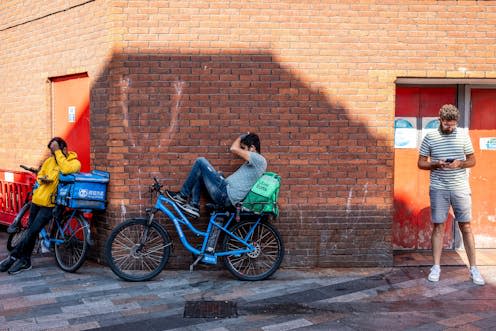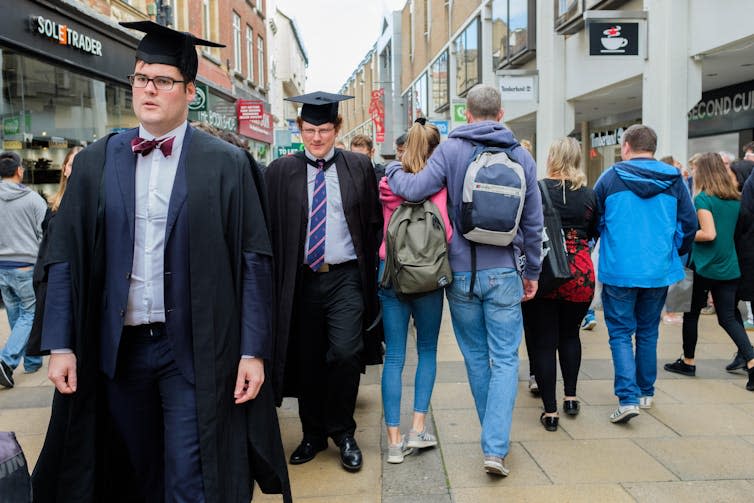
Gig economy workers take a break in Chinatow, London. Shutterstock/Grant Rooney
Social class continues to influence British people’s opportunities and the way they think about them, even if the boundaries between those classes have shifted.
In the third part of Know Your Place: what happened to class in British politics, a podcast series from The Conversation Documentaries, we explore how class is defined and measured, and how the UK’s changing class identity interacts with identity politics.
Over the course of the last half century, there’s been a big shift in the make up of the labour market, and a decline in what are traditionally considered working class jobs, such as in manufacturing. And yet, data from the annual British Social Attitudes (BSA) survey run by the National Centre for Social Research, found that 52% of people identify as working class compared with 43% who identify as middle class.
According to Oliver Heath, professor of politics at Royal Holloway University of London, who co-authored the chapter on class for the BSA report in 2023, people still think about themselves in class terms to exactly the same degree as they did 40 years ago.
There’s been no decline in terms of whether people think of themselves as identifying with a class, and no decline in whether they identify with being working class or not. So that seems remarkably stable and if anything showed some signs of actually increasing.
The growth of self-employment, and in particular the gig economy, has disrupted the UK’s traditional class structure, according to Daniel Evans, a lecturer of criminology, sociology and social policy at Swansea University.
The size of the formally self-employed has absolutely exploded. It’s close to about 5 million, which is coming very close to the size of the entire public sector. This is absolutely unprecedented. In the early 1970s, it was about 1 million self-employed people.
Evans argues this has also muddled what it means to be part of the petit bourgeoisie, someone who own the means of your own production in a Marxist sense.
So many people are doing almost like bogus forms of self-employment. Whereas in the past, lots and lots of people are doing this voluntarily, a lot of working class people aspired to join the ranks of the self-employed because they wanted to be their own boss … more and more people have been forced, basically, into self-employment.
Education, education, education
Amid these shifts, education has become a dominant force in recent years, overriding class defined by occupation or income as the most influential factor in voter behaviour. According to Paula Surridge, professor of political sociology at the University of Bristol, this was true for the Brexit vote too, she says.
Education is a stronger predictor of Brexit vote than class, with those with degree or higher level education more likely to vote remain than those with lower level qualifications. And the reason for that is the Brexit vote was primarily driven by a set of social values that don’t relate to economics.


Town and gown: Britain’s modern political divide. Shutterstock
This can be a tricky dynamic to talk about. The education divide is not a term intended to deliver a value judgement but describes two distinct experiences of life. The university population in the UK has exploded since the 1990s and going to university has a profound effect on a person’s outlook, according to John Curtice, professor of politics at the University of Strathclyde and senior research fellow at Natcen:
The experience of university, where people get mixed with people from diverse backgrounds, they’re encouraged, particularly in the humanities, to be critically reflective about culture, etc. that that seems to create a rather more socially liberal ambience.
For more analysis, listen to the full episode of Know Your Place: what happened to class in British politics on The Conversation Documentaries.
A transcript is available on Apple Podcasts.
Know Your Place: what happened to class in British politics is produced and mixed by Anouk Millet for The Conversation. It’s supported by the National Centre for Social Research.
Newsclips in the episode from BBC Newsnight, Financial Times, The Frost Report, CBC News, Sky News, France24 English, AP Archive, BBC News, Official Jeremy Corbyn Channel and Channel 4 News.
Listen to The Conversation Documentaries via any of the apps listed above, download it directly via our RSS feed or find out how else to listen here.
This article is republished from The Conversation under a Creative Commons license. Read the original article.
John Curtice receives funding from UKRI-ESRC. Tim Bale has previously received funding for research on the Conservative Party and party members from the Leverhulme Trust and from the Economic and Social Research Council. Oliver Heath does not work for, consult, own shares in or receive funding from any company or organisation that would benefit from this article, and has disclosed no relevant affiliations beyond their academic appointment. Paula Surridge does not work for, consult, own shares in or receive funding from any company or organisation that would benefit from this article, and has disclosed no relevant affiliations beyond their academic appointment. Daniel Evans does not work for, consult, own shares in or receive funding from any company or organisation that would benefit from this article, and has disclosed no relevant affiliations beyond their academic appointment. Know Your Place: what happened to class in British politics is supported by the National Centre for Social Research.